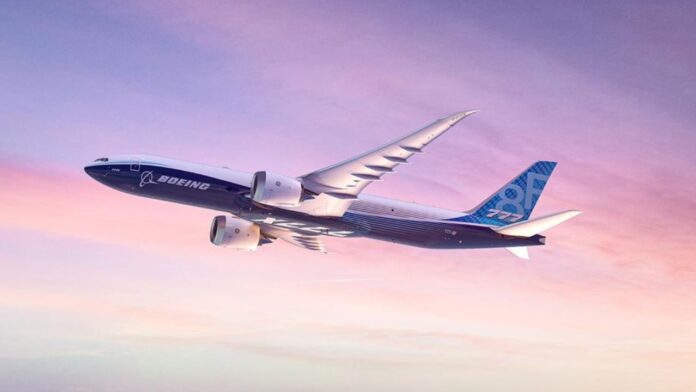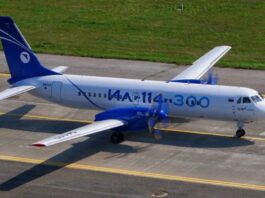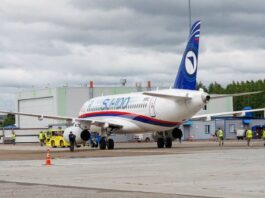Air Lease, the launch customer for Airbus’s A350F, has canceled its entire order for the European rival’s next-generation cargo aircraft, while Boeing has begun assembly of its first 777-8F freighter in a dramatic week for the global air cargo industry. The aviation sector has been shaken by the timing of these two pronouncements, which has prompted inquiries regarding the future of the widebody freighter market and the intense competition between the world’s two largest aircraft manufacturers.
Boeing’s 777-8F: A New Era for Cargo
At its Everett, Washington facility, Boeing has initiated production of the initial critical structural components of the 777-8F, including a huge 30-meter wing spar. This new freighter, which is a member of the 777X family, is intended to replace the aging 777F and 747F variants and directly compete with the Airbus A350F. The 777-8F is expected to deliver substantial improvements in fuel efficiency and emissions, with a payload capacity that exceeds 100 tons and a range of up to 8,000 kilometers. Boeing’s decision is part of its efforts to reclaim its position as a leader in the heavy freighter market, which is essential for global logistics and e-commerce. The 777-8F is anticipated to come into service in 2028, and its development is regarded as a strategic endeavor to revitalize the 777X program in the face of ongoing certification delays for its passenger variant.
Air Lease Abandons the A350F
Air Lease Corporation (ALC), which had previously placed an order for seven aircraft as the launch customer for the Airbus A350F, has now discreetly removed the freighter from its order book. Less than four years have passed since ALC made its high-profile commitment at the 2021 Dubai Airshow. We anticipate the A350F, currently in the development phase, to be operational in the latter half of 2027. It was praised for its fuel efficiency, advanced composite structure, and innovative cargo door design. Airbus continues to maintain firm orders for 66 A350Fs; however, the loss of its launch customer is a substantial setback that raises concerns regarding the program’s momentum and market appeal.
Boeing vs. Airbus: The Competitive Landscape
These incidents are not isolated. They are indicative of the growing competition between Boeing and Airbus in the lucrative large freighter market. The 777-8F and A350F are both positioned as the future of air cargo, providing airlines and lessors with the opportunity to modernize their fleets in response to increasing demand and more stringent environmental regulations. Airbus’s A350F is designed to achieve operational flexibility and efficiency by utilizing the largest main-deck cargo port in the industry and lightweight composite materials. Boeing’s 777-8F is positioned as a high-payload, long-haul workhorse, featuring cutting-edge aerodynamics and powerful GE9X engines.
Is There a Connection?
The abrupt cancellation of Air Lease’s A350F order coincides with Boeing’s expansion of its 777-8F program, which may indicate a potential shift in market sentiment. Although there is no public affirmation that Boeing’s progress directly influenced ALC’s decision, industry analysts observe that lessors and airlines are closely monitoring the technical, economic, and regulatory advancements of both programs. The 777-8F’s increased payload and Boeing’s aggressive effort to revitalize its widebody program may have rendered it a more appealing alternative for certain customers, particularly in light of the A350F’s delayed entrance into service and the departure of a significant early supporter. The competitive dynamics between Boeing and Airbus are unmistakably influencing the strategies and decisions of significant industry actors in this context.
Customer Interest in the A350F and 777-8F
The Airbus A350F, despite the cancellation of Air Lease Corporation’s order, continues to garner significant interest from a diverse array of prominent airlines and cargo operators worldwide. Airbus has received definitive orders from at least 11 customers, totaling 66 aircraft, as of mid-2025. Etihad Airways, Starlux Airlines, CMA CGM Air Cargo, Singapore Airlines, Cathay Pacific, Turkish Airlines, Air France, Martinair, Silk Way West Airlines, and MNG Airlines are among the most notable clients. Additionally, AviLease, a Saudi lessor, has made a substantial investment by placing an initial order for 10 aircraft and has the potential to expand to 22. The A350F’s broad appeal and the confidence of both passenger airlines and dedicated cargo carriers in Airbus’s next-generation freighter are illustrated by its diverse customer base.
Notable global cargo operators on the Boeing side have also shown significant interest in the 777-8F. Qatar Airways is a noteworthy launch customer, having placed a substantial order for 34 aircraft. Silk Way West Airlines, Ethiopian Airlines, Lufthansa Cargo, and Emirates SkyCargo are among the other significant customers that have placed orders for two to seven aircraft. Cargolux is in the process of renewing its fleet with 10 777-8Fs. These commitments, which offer advanced performance, increased payload capacity, and enhanced fuel efficiency, emphasize the market’s enthusiasm for Boeing’s new freighter. The A350F and 777-8F have a strong order book, which is expected to lead to fierce competition as each manufacturer endeavors to dominate the next era of global air cargo.
The Stakes for Global Air Cargo
The next few years will be critical. The choices available to cargo operators worldwide will be influenced by Boeing’s capacity to deliver the 777-8F on time and Airbus’s response to the A350F setback. The conflict between the 777-8F and A350F is not solely about aircraft specifications; it is also about the establishment of the standard for the next generation of global air freight, as e-commerce and global trade have shown no indications of slowing. The correlation between Boeing’s milestone and Airbus’s challenge is evident as the world’s largest lessors and airlines evaluate their options: the future of air cargo will be determined by innovation, execution, and the capacity to adjust to changing market dynamics. The competition is intensifying, with the stakes at an all-time high.
Official Website of Youtube Channel – Altitude Addicts




